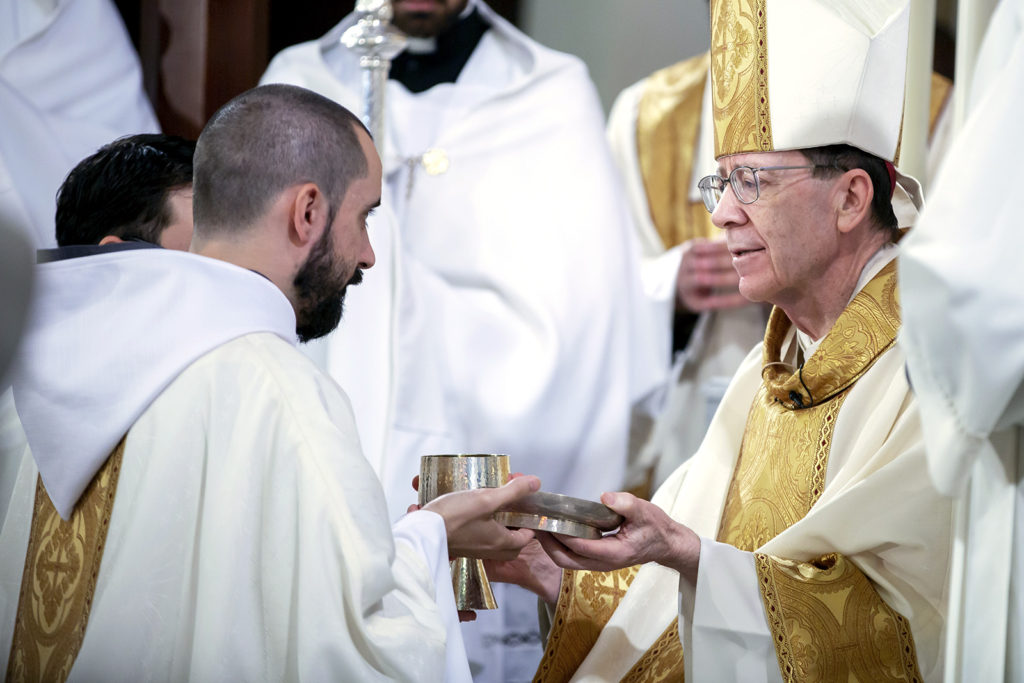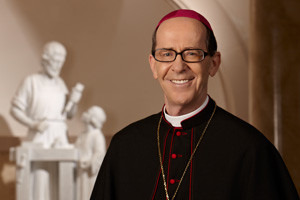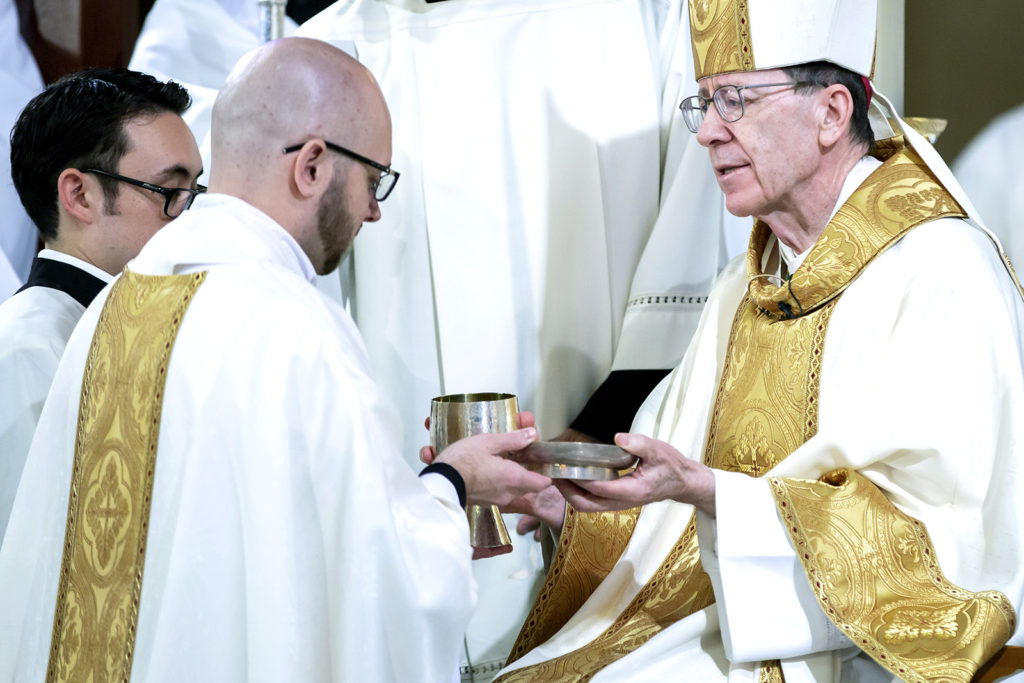

Holy Yet Needing Purification
Last in a Series
We come now to the sixth and final column of this series addressing the recent scandals that have so hurt the Church. The title of this series comes from the words of the Second Vatican Council which eloquently explained that “the Church, however, clasping sinners to her bosom, at once holy and always in need of purification, follows constantly the path of penance and renewal” (“Lumen Gentium” 8). These prophetic words issued in a time of relative calm and stability more than 50 years ago speak truth that can stabilize and encourage us today.
Having looked squarely at the scandals and underlying causes, then at current questions regarding the priesthood, signs of renewal as well as the work being done to ensure the safety of youth and vulnerable adults, I would now like to look toward the renewal of the priesthood in light of one underlying virtue that will be important for its healing: the virtue of reverence.
The Priest: A Man of Reverence

While the word “reverence” may recall ideas about attire or behavior at church, it includes much more. In a broad sense, reverence is the virtue by which we acknowledge mystery in creation, ourselves, our neighbors and, most especially, in God. Reverence is a fundamental disposition of anyone who is seeking life’s deepest meaning. It is the humble recognition that there is more to life than we can see and feel and control.
Dietrich von Hildebrand, a philosopher known for his strong opposition to the Nazi regime, said that “Reverence is indispensable to any adequate knowledge of being. The depth and plenitude of being, and above all its mysteries, will never be revealed to any but the reverent mind. … Only the reverent man who is ready to admit the existence of something greater than himself, who is willing to be silent and let the object speak to him — who opens himself — is capable of entering the sublime world of values” (Triumph magazine, October 1966).
When considering the priesthood that Jesus Himself instituted, we cannot help but think of reverence as a necessary virtue for one called to such a life. Reverence in no way implies a kind of spiritual escape into prayer to avoid the real struggles of life in a fallen world. It simply implies facing them with the Lord who has come to bring light into even the darkest areas of our hearts and culture. What we have seen in the scandals of the Church is a tragic irreverence for God Himself, irreverence for the priesthood of Jesus Christ and irreverence for children and the vulnerable.
Time and again, we have seen in the lives of great reformers of past ages who led the Church out of difficult days, such as St. Benedict, the monks of Cluny, St. Francis, St. Catherine of Siena, St. Philip Neri and St. Pius X, a spirit of true and humble reverence for God and His creation that allowed for renewal and healing. Every one of these reforms followed times of irreverence for God and disregard for His commandments. Von Hildebrand said that one who is irreverent “approaches being either in an attitude of arrogant superiority or of tactless, smug familiarity” (Ibid.). And since, in “no domain is reverence more important than religion,” in no domain can irreverence do more damage.
Reverence for God
Only a priesthood imbued with reverence can be a force for reform and renewal. To lead people into the mystery of God’s love, a priest must first stand humbly before that divine mystery. The priest can then invite others into this mystery with words like these from Psalm 33: “all the earth fear the Lord; let all the inhabitants of the world stand in awe of Him” (8). St. Paul was such a priest as he explained that “no eye has seen, nor ear heard, nor the heart of man conceived, what God has prepared for those who love Him” (1 Cor 2:9). Christian tradition has always sung of God’s wondrous love with songs like “What Child is This?”, “What Wonderous Love?” or the “Tantum Ergo.” Indeed, we priests are to bring such a disposition of reverence to the bedsides of the dying, to confessionals, to altars of Christ’s sacrifice, to pulpits and to our daily interactions with His flock, acknowledging God who is present to His people.
Reverence for Christ’s Priesthood
The priesthood itself is a mystery. It is not a mere career or a life of organizational management, problem solving or completing of tasks. This vocation has a unique place in the design of God for our eternal destiny with the Trinity as the priest stands in persona Christi for the forgiveness of sins and to provide the Bread of Life despite his weakness and unworthiness. This should move each priest to humility and awe as he assists creatures in their communion with their Creator. In ministry imbued with reverence, he can then say to the baptized the priestly words of the letter to the Hebrews: “let us be grateful for receiving a kingdom that cannot be shaken, and thus let us offer to God acceptable worship, with reverence and awe; for our God is a consuming fire” (12:28-29).
It would be a great irreverence to treat the priesthood as a mere occupation or, as I have said in previous columns, as only a necessary functionalistic role with no reference to the mystery of God. And it would be far worse, even diabolic, for the priesthood to be manipulated and used for the committal of sins against the vulnerable. Herein lies the reason why the most reverent and faithful in the Church feel most deeply the pain of scandals.
Conversely, great reverence is shown for Jesus when a priest’s personality does not overpower his ministry, when he humbly passes on what he has received (1 Cor 11:23) and what is declared to be true. When calling a man to the priesthood, Jesus is not inviting him to eclipse His Master but to radiate Him. He is not calling a man “to be served, but to serve” (Mt 20:28). When the future Pope Benedict XVI processed into the church for his first Mass as Fr. Joseph Ratzinger, feeling the admiration of the people in his hometown, he kept repeating to himself in his heart, “It’s not about you, Joseph.” The priesthood is far beyond the minister, it is and must always be about Jesus Christ.

Reverence for the Holy Things
During the Ordination rite, the bishop hands to a priest the paten and chalice with the bread and wine that is to be consecrated and then speaks the following words: “Receive the oblation of the holy people to be offered to God. Understand what you do, imitate what you celebrate, and conform your life to the mystery of the Lord’s Cross.”
The priest works with and around the most sacred of things. The greatest gift of Jesus’ love is His very presence in the Most Blessed Sacrament. There is no object in this world toward which we should show greater devotion and reverence. This is why we have chapels where Jesus is adored around the clock every day of the week.
The Second Vatican Council explains that “pastoral charity flows out in a very special way from the Eucharistic sacrifice. This stands as the root and center of the whole life of a priest. What takes place on the altar of sacrifice, the priestly heart must make his own. This cannot be done unless priests through prayer continue to penetrate more deeply into the mystery of Christ” (“Presbyterorum Ordinis” 14). The priest himself, then, must be the first to follow the words of St. Augustine who says, “no one eats that flesh without first adoring it; we should sin were we not to adore it” (“Expositions on the Psalms,” 98:9).
Reverence for God’s People
What an honor it is to serve others. So far from being a burden, ministry to those for whom our Savior offered His life is a gift, a work to be carried out with gratitude. We are blessed in our time by the witness of Pope Francis who teaches us that all life has “inestimable value … even the weakest and most vulnerable; the sick, the old, the unborn and the poor are masterpieces of God’s creation, made in His own image, destined to live forever and deserving of the utmost reverence and respect” (Message to Catholics taking part in annual Day for Life in Britain and Ireland, July 28, 2013).
When a priest offers guidance, when he ministers the forgiveness of sins or the spiritual nourishment that comes with Holy Communion, he is bringing graces that can reverberate for eternity, serving those with whom God wills to live forever.
Reverence for Self
Finally, while the priest humbly acknowledges that his priesthood is not about himself, he must also acknowledge that his Creator still made him good and that God’s grace builds on nature. Like all people, the priest, too, is to show reverence for His creator by how he cares for himself. Studies of the priesthood, like those carried out by Msgr. Stephen Rossetti, show that most priests are happy (more than 90 percent). This makes sense because most priests are faithful to prayer and are convicted of God’s love in their lives. These studies also show that the factors that lead to a priest’s happiness are built around a reverence for himself as a person. Over and above the obviously important factors around his relationship with the Lord (prayer, Marian devotion, Adoration, etc.), it is common for happy priests to have good friendships, exercise regularly and to have healthy leisure. These help a priest to live a balanced life that allows for faithful and reverent service.
I pray that these reflections have given you support and encouragement in these turbulent times. Thank you for your prayers and support for me and for our priests. The turbulence of our time, though we feel it deeply, is by no means so great as to overpower the love that comes from the Sacred Heart of our Savior. The virtue of reverence allows us to know this truth and remain in that security and peace.





